|
|
|
Sort Order |
|
|
|
Items / Page
|
|
|
|
|
|
|
| Srl | Item |
| 1 |
ID:
123261
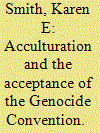

|
|
|
|
|
| Publication |
2013.
|
| Summary/Abstract |
This article contributes to the burgeoning literature on why states ratify human rights treaties. It first analyses why Ireland, the United Kingdom and the United States did not initially ratify or accede to the 1948 Genocide Convention, and then explores why the three countries eventually did accept it, 20-40 years after it was approved by the United Nations General Assembly. The extent to which material costs and benefits, the logic of appropriateness, and acculturation played a role in each of the three cases is assessed. Acculturation is particularly evident in the Irish case, but it also helps to explain the UK and US acceptance of the Convention.
|
|
|
|
|
|
|
|
|
|
|
|
|
|
|
|
| 2 |
ID:
114996
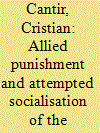

|
|
|
|
|
| Publication |
2011.
|
| Summary/Abstract |
This article makes theoretical and empirical contributions to the recent literature on the socialisation and punishment of state and non-state actors. First, it argues that the English School can add significantly to our understanding of the socialisation and punishment processes because of the theory's emphasis on great powers as 'custodians' of the society of states. Second, it analyses the policies of the United Kingdom, France, and, to a lesser degree, a number of other powers toward the Bolsheviks and the Whites during the Civil War and beyond (1917-1924). The basic argument is that London, Paris, and other capitals acted like 'guardians' of the society of states in their attempt to punish and socialise the participants in the Civil War.
|
|
|
|
|
|
|
|
|
|
|
|
|
|
|
|
| 3 |
ID:
151419
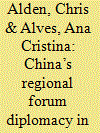

|
|
|
|
|
| Summary/Abstract |
This article examines Chinese-led regional forums in the developing world where the Chinese preponderance of economic power is self-evident, its financial largesse is readily utilised to sustain these endeavours, its bureaucracies are empowered to guide the conduct of institutional activities, and its normative intentions and interests are given fullest expression.
|
|
|
|
|
|
|
|
|
|
|
|
|
|
|
|
| 4 |
ID:
140824
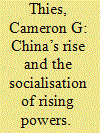

|
|
|
|
|
| Summary/Abstract |
The rise of China, and other states whose material power and ideational aspirations have outpaced that of their peers, presents an interesting challenge to international relations theorists. Structural theories rooted in realism tend to predict that changes in material power inexorably lead to conflict that reshuffles the pecking order at the pinnacle of the international system. Such theories also tend to ignore identity and other ideational factors that may condition the interaction of rising and dominant great powers. This article develops a theoretical approach to state socialisation of rising powers. While considering the importance of increasing material capabilities, this approach also examines the types of roles that states occupy in the international social system and the ability of great powers to socialise rising powers into what they consider to be appropriate roles. The 1995–1996 Taiwan Straits Crisis is analysed through this theoretical framework to demonstrate that although both China and the United States attempted to altercast each other in a socialisation process, neither was successful. China pursued its own, self-conceived role conceptions in the situation, as did the United States, setting the stage for renewed rivalry between the two powerful states. The case demonstrates the difficulty of constraining rising powers’ aspirations when their material power allows them to pursue the identities of their choice, even in the face of strong socialisation efforts from the dominant power and its supporters.
|
|
|
|
|
|
|
|
|
|
|
|
|
|
|
|
| 5 |
ID:
164032
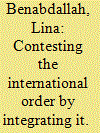

|
|
|
|
|
| Summary/Abstract |
What does the Belt and Road initiative (BRI) tell us about China’s perceptions of the international order? This paper takes an inductive approach by examining the BRI for a two-pronged purpose: first, to understand China’s perception of the international order by examining Beijing’s official discourse around its intentions and vision for the initiative; and, second, to examine the mechanisms through which Chinese norms are diffused and normalised in Global South states. I find that Chinese policy navigates a dialectical interchange between upholding the existing international order while simultaneously promoting alternative norms and practices to reform parts of the order that are unsatisfactory to Chinese interests. To answer the second part of the puzzle, the paper finds that a central socialisation mechanism in China’s foreign policy for Global South states occurs through professionalisation training programmes. These programmes allow for Chinese expert knowledge and technical know-how to be shared with and mimicked by elites and civil servants across many Global South states.
|
|
|
|
|
|
|
|
|
|
|
|
|
|
|
|
| 6 |
ID:
174073
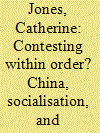

|
|
|
|
|
| Summary/Abstract |
Debates on China’s engagement with international institutions centre on a (false) dichotomy that China is either a status-quo or revisionist power. Both sides of this debate have ample empirical evidence to support their arguments and they tend towards conclusions that China’s behaviour and preferences lie in the space in between these two positions. It is important to consider how China presents a contest to international order from with international institutions.
|
|
|
|
|
|
|
|
|
|
|
|
|
|
|
|
| 7 |
ID:
183985
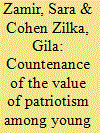

|
|
|
|
|
| Summary/Abstract |
This articles examines the countenance of patriotism and its tendencies among young and mature pre-service teachers during their apprenticeship at school. In order to answer the research questions, we applied mixed methods, both qualitative and quantitative. Our findings show that both the younger and the older students believe that patriotic content should be included in the curriculum. Yet younger students defined patriotism as mere ‘connection’ to the country while the older students defined patriotism in more emotional terms, showing more intense attachment to the country.
|
|
|
|
|
|
|
|
|
|
|
|
|
|
|
|
| 8 |
ID:
127002
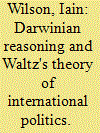

|
|
|
|
|
| Publication |
2013.
|
| Summary/Abstract |
There are important parallels between the pattern of inference Kenneth Waltz uses in his Theory of International Politics and early Darwinian reasoning. This early Darwinian thinking has needed to be significantly refined by modern evolutionary biologists, and their amendments are equally relevant to Waltz's model. Waltz allows for states to imitate each other and also accepts that they are only rarely eliminated from the system. Modern Darwinian analyses show that where elimination is rare and imitation is common, it is quite possible for deleterious behaviours to become widespread. We cannot assume an anarchic system will select for security-enhancing behaviours in major powers. Thinking about Waltz's argument in these terms opens space to disagree with his conclusions while respecting the strength of his logic.
|
|
|
|
|
|
|
|
|
|
|
|
|
|
|
|
| 9 |
ID:
160379
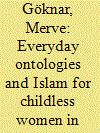

|
|
|
|
|
| Summary/Abstract |
This article discusses the significance of everyday Islam as a gendered locus for socialisation. Religious practices and conversations about religion comprise a major part of quotidian activities in the two villages in northwestern Turkey where the research took place. Men and women's everyday interaction with Islam dominated their ways of thinking, acting and especially socialising. Exploring the ways in which the Qur’an and the Hadith as discursive resources of Islam influence power relations and everyday practices, the article argues that Islamic morality co-exists with everyday Islam.
|
|
|
|
|
|
|
|
|
|
|
|
|
|
|
|
| 10 |
ID:
073145
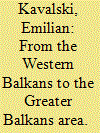

|
|
|
| 11 |
ID:
186128
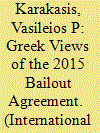

|
|
|
|
|
| Summary/Abstract |
In July 2015, after intense negotiations with its creditors, Greece received a bailout in exchange for fiscal restraint. The coalition government at that time, led by the left-wing SYRIZA party, elected on the basis of an anti-austerity platform, eventually accepted the prevalent austerity frames of the creditors. Through the aid of Q-method, an analysis of Greek opinion leaders’ views of the negotiation highlights that this outcome can be explained in two different ways. The first posits that the ideological overtones that ruling SYRIZA injected in its negotiation strategy exhibited a lack of socialisation and undermined Greece’s already weak bargaining position. The second focuses on the institutional status quo bias in the Eurogroup in Germany’s favour, which discourages any change in the Eurozone. These two views may have partly been influenced by questions of political accountability.
|
|
|
|
|
|
|
|
|
|
|
|
|
|
|
|
| 12 |
ID:
032484
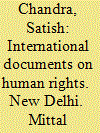

|
|
|
|
|
| Publication |
New Delhi, Mittal Publications, 1990.
|
| Description |
xxxc, 507p.
|
| Standard Number |
8170992036
|
|
|
|
|
|
|
|
|
|
|
|
Copies: C:1/I:0,R:0,Q:0
Circulation
| Accession# | Call# | Current Location | Status | Policy | Location |
| 032631 | 341.482/CHA 032631 | Main | On Shelf | General | |
|
|
|
|
| 13 |
ID:
151566
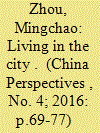

|
|
|
|
|
| Summary/Abstract |
Based on an ethnographic survey in a primary school for the children of rural migrant workers in Hangzhou, this study examines the effects of the process of stigmatisation and the forms of internalisation associated with the “nongmingong” status of their parents. It also looks at how some of these “children of nongmingong” who go to school in the city are able to reverse this stigma. In particular, the study analyses the identity strategies deployed by students aged between ten and fourteen to deal with the stigma of their place of abode, by drawing a distinction between individual strategies (when they are alone with the investigator) and group strategies (in the presence of their peers at school).
|
|
|
|
|
|
|
|
|
|
|
|
|
|
|
|
| 14 |
ID:
148319
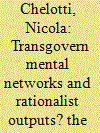

|
|
|
|
|
| Summary/Abstract |
The European Union (EU) foreign policy has gone beyond intergovernmentalism. It is largely formulated by (Brussels-based) national officials, in a process characterised by a high number of cooperative practices, diffuse sentiments of group loyalty and possibly argumentative procedures. Yet, in many cases, the most likely output of this process reflects the lowest common denominator of states’ positions or the preferences of the biggest states. The article intends to investigate this puzzle. In the first part, it corroborates its existence by using answers from an original database of 138 questionnaires and 37 interviews with EU negotiators. Next, it argues that cooperative practices remain often subordinated to nationally oriented ways of doing things. Consequentialist practices perform an anchoring function, in that they define the parameters around which (social) practices operate. The last section looks more closely at the sites of and meanings attached to EU foreign policy-making. By discussing national diplomats’ conspicuous leeway in Brussels, it also argues that negotiating practices are performed through a mix of partial agency and persistence of national dispositions. On the whole, changing practices is difficult, even in dense and largely autonomous settings such as EU foreign policy. The social construction of EU foreign policy occurs only to a partial extent.
|
|
|
|
|
|
|
|
|
|
|
|
|
|
|
|
| 15 |
ID:
139487
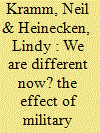

|
|
|
|
|
| Summary/Abstract |
This study examines how young people who have joined the South African National Defence Force (SANDF) on the two-year Military Skills Development System (MSDS) contract experience military service, and the effect this has on their ability to readapt to civilian life. The first part of the study examines the theoretical debates associated with military socialisation and reintegration into civilian life. Hereafter, the findings are presented in terms of the experiences of MSDS privates serving in the infantry, those that have left, and the perceptions of employment agencies in terms of the marketability of military skills. The conclusion is reached that MSDS members experience their two years in the SANDF as life-changing, that this affects their ability to reintegrate back into civilian society, and that the skills acquired during military training is of limited market value. The conclusion is reached that more needs to be done to assist these young military veterans to adapt to civilian life and to augment their military experience with more marketable skills to enable them to find gainful employment.
|
|
|
|
|
|
|
|
|
|
|
|
|
|
|
|
|
|
|
|
|